Concordia research shows that children as young as 18 months understand stoicism. When you’re one and a half years old, having your favourite ball
taken away is likely to result in a temper tantrum. But while babies
wear their feelings on the sleeves of their onesies, adults often mask
their emotions, responding to life’s disappointments with stoic reserve. While you might think that witnessing such reactions would confuse
toddlers and lead them to believe emotionally reserved adults aren’t
being honest — so by extension are untrustworthy to begin with — new
research shows that they actually do understand that a stiff upper lip
can be appropriate in certain situations.
In a study recently published in the journal Infant Behavior and Development,
Concordia psychology researchers showed 71 18-month-old toddlers a
series of events during which an actor had an object stolen from her. In
one scenario, infants then saw the actor display sadness while in the
other she remained neutral. Afterwards, the infants interacted with the
actor in several basic tasks.
“Because our research subjects can’t yet speak to us in full
sentences, we monitor their eye movements and look for non-verbal
reactions,” says lead author Sabrina Chiarella, who recently completed
her PhD in psychology at Concordia. “We saw infants in both groups spend
an equal amount of time looking at the scene and engaging in similar
levels of hypothesis testing —looking back and forth between the actor’s
face and empty hand and back to their parents to make sure everything
was okay.”
But while the infants displayed less concern for neutral than sad
individuals after a negative event, they were just as willing to help
and imitate them — and be guided by their emotional expressions — as
they were for those individuals who expressed appropriate sadness after a
negative experience.
“It seems toddlers are willing to give stoic people the benefit of
the doubt,” suggests Chiarella. “They understand that sadness is the
more appropriate reaction but also that a neutral response doesn’t
necessarily mean a person is untrustworthy.”
The experiment confirms that, at 18 months, infants consider a
neutral expression just as appropriate as a sad expression following a
negative experience. And because the infants showed greater empathy
towards those who expressed sadness, the study further demonstrated that
toddlers are sensitive to the significance of emotional expressions
following negative events.
“Because others’ behaviours can often be explained through their
emotional expressions, understanding those expressions is critical in
early development,” says senior author and Concordia psychology
professor, Diane Poulin-Dubois. “Our research has helped confirm that
children at a young age do not consider a lack of emotional reaction as
unjustified. This, in turn means they will be able to build trusting
relationships with those who are less emotionally expressive in a
negative situation.”
So parents can relax: there’s no need to throw a temper tantrum next
time you lose your keys. Your toddler will still trust you, even if you
choose to grin and bear it.
